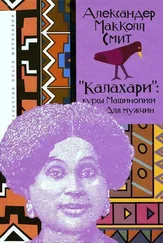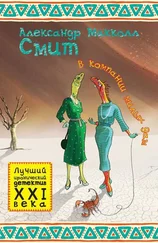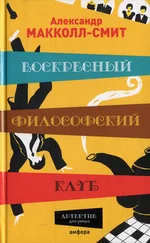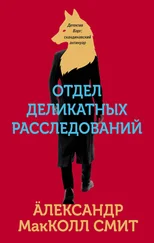‘But the gate is not,’ said Mma Ramotswe miserably. ‘And my van will have a big dent, Mma. I can hardly bear to look.’
‘I will look, then,’ said Mma Makutsi, opening her door.
She stepped outside and made her way round to the front of the van. Mma Ramotswe watched as Mma Makutsi stooped to inspect the damage. She saw her shake her head and then look up with a grave expression. The large glasses had slipped down her nose as she bent down; she pushed them back into position.
‘There is a big dent, Mma,’ she said. ‘But there is no damage to the lights. They will fix this very easily.’
Mma Ramotswe sighed. Mr J. L. B. Matekoni was understanding, but she knew his views on her van, which he thought should have been retired a long time ago. He would assess the damage and then suggest that rather than fix it he should get her a new van. They had been through that before – on more than one occasion – and she had always resisted the suggestion. Eventually he had taken matters into his own hands and bought her a replacement van, but she had never taken to it and eventually she had got her old van back. She did not want to go through all that again.
‘And the gate, Mma?’ she asked through the window.
The gate had recoiled a few inches after the impact and seemed now to be hanging slightly askew. Mma Makutsi gave it a tentative push and from somewhere in the vicinity there came the strained, whirring sound of an electric motor engaging. Then it stopped.
‘There is still room for us to go through,’ Mma Ramotswe called out through the window. ‘Get back in and we can park the van. We’ll tell them about their gate.’
‘Would you like me to speak to them?’ asked Mma Makutsi as she got back into the cab.
‘No, I can tell them.’
‘I meant: would you like me to say that I did it?’
Mma Ramotswe frowned. ‘But I did it, Mma. I was the one who was driving.’
‘Yes, but it might reflect better on the agency if I said I did. Then they won’t think that the person in charge is a lady who goes about hitting gates.’
‘But I do,’ said Mma Ramotswe. ‘I hit a gate up at Mochudi once. And Mr J. L. B Matekoni hit our own gate back at Zebra Drive. We have a bad record when it comes to gates, Mma.’
They both laughed, but Mma Ramotswe had been given something to think about. If proof were needed of the loyalty of Mma Makutsi, and of her concern for the reputation of the business, then it had just been provided and convincingly so. It was loyalty – pure and simple loyalty – and that was something which she could never have learned at the Botswana Secretarial College, but which had to come from somewhere deep down inside.
Having parked the van at the top of the drive, they got out and made their way onto a large shady veranda that ran the length of the front of the house. An elegant cluster of chairs occupied one end of this veranda, and behind them there was a long bar for the serving of food and drinks. The chairs were covered with what looked like zebra skin and there was a distinct air of opulence about the place. Mma Ramotswe and Mma Makutsi exchanged glances.
A door opened and Miss Rose appeared.
‘Mma Ramotswe!’ she exclaimed. ‘And Mma Maputi.’
‘Makutsi.’ The correction was made in a tone of slight disapproval.
‘Of course – I’m sorry, Mma. I should know how annoying it is when people get your name wrong. If you’re called Chattopadhyay you know all about that.’
They were still standing on the veranda. As Miss Rose turned to lead them into the house, she stopped and stared down the drive. ‘The gate —’ she began.
Mma Ramotswe stopped her. ‘It is my fault, Mma, I am very sorry indeed. I seem to have hit the gate with my van. I shall pay for it to be fixed.’
Miss Rose turned to face her. ‘No, Mma, it cannot be your fault. These electric gates are dangerous. They are always opening and closing according to some strange programme of their own.’ She paused. ‘And anyway, if it is anybody’s fault it is mine. I am the one who operated the switch for the gate to open when I saw your van coming. I must have pushed it the wrong way when you were halfway through.’
Mma Ramotswe held up her hands. ‘I’m sure it was not you…’
‘No, it probably was,’ said Mma Makutsi.
Mma Ramotswe gasped. ‘No, Mma, we must not blame Miss Rose.’
‘But she said it was her fault,’ said Mma Makutsi.
‘Yes, I did,’ said Miss Rose, throwing Mma Makutsi a sideways glance. ‘But let’s not waste our time talking about milk that has already been spilt.’
‘Nor crying over it,’ said Mma Makutsi. ‘You cry over spilt milk, I think.’
‘I know that, Mma,’ muttered Miss Rose. ‘It is a figure of speech, I believe. I know about those things.’
As they were led down a corridor into a large living room at the side of the house, Mma Ramotswe whispered to Mma Makutsi, ‘Please try to be tactful, Mma. Have a little tact.’
She could feel Mma Makutsi bristling. ‘It was her fault that the gate closed as we were going through, Mma Ramotswe. You heard her. She said it, not me.’
‘I know, I know. But the point is, Mma, that she is the client . Remember what Clovis Andersen said about the client. You never argue with the client.’
They had reached the end of the corridor and perforce the end, too, of their whispered conversation. The room into which they now went was large and formal, decorated in a somewhat heavy style with a great deal of gilt, fringes and tassels. On the wall there were pictures of idealised landscapes and buildings: Himalayas, Rajasthan, the Taj Mahal by moonlight.
‘This is very beautiful,’ said Mma Ramotswe.
‘Yes,’ said Miss Rose. ‘It is very fine.’ She had become businesslike. ‘If you ladies sit down, I’ll fetch her.’
‘Before you do,’ said Mma Ramotswe, ‘can you tell me what you call this lady? You said that she could not remember her name.’
Miss Rose smiled. ‘We call her Mrs. Just Mrs. That is the best thing. That is what she’ll expect you to call her.’
Mma Makutsi opened her mouth to say something, but was silenced by a look from Mma Ramotswe. When Miss Rose left the room, though, she leaned across to Mma Ramotswe and said in a loud whisper, ‘But you cannot call somebody Mrs! Mrs is not quite the same as Mma, is it? Mrs needs to be Mrs Something, not just Mrs… Mrs Air!’
‘Hush,’ said Mma Ramotswe. She wanted to tell Mma Makutsi that this was a delicate enquiry – Mrs, after all, had no memory and was presumably in a distressed state – and their questioning would have to be very careful. She searched her own memory for any relevant passage from Clovis Andersen that she could quote to Mma Makutsi, but could think only of the advice he gave not to bully people when questioning them. The person to whom you are talking will always be readier to help if you are polite and friendly , he wrote. Never shine a light in somebody’s face. No third degree . He was right, of course, but she decided that now was not the time to discuss techniques with Mma Makutsi, and anyway, there were footsteps in the corridor outside.
‘This is Mrs,’ announced Miss Rose.
Mma Ramotswe rose to her feet and shook hands with the woman who had accompanied Miss Rose into the room. She saw a well-dressed Indian woman of about forty, perhaps slightly less, with what Mr J. L. B. Matekoni would have described as a ‘pleasing face’. A pleasing face was not necessarily beautiful in the conventional sense – it was, rather, comfortable. It was the sort of face that suggested equanimity.
Mma Ramotswe introduced Mma Makutsi, who also shook hands. Then the four of them sat down around a low table.
Читать дальше







![Александр Макколл Смит - Отдел деликатных расследований [litres]](/books/397661/aleksandr-makkoll-smit-otdel-delikatnyh-rassledova-thumb.webp)




